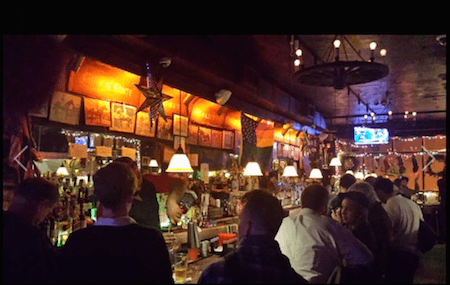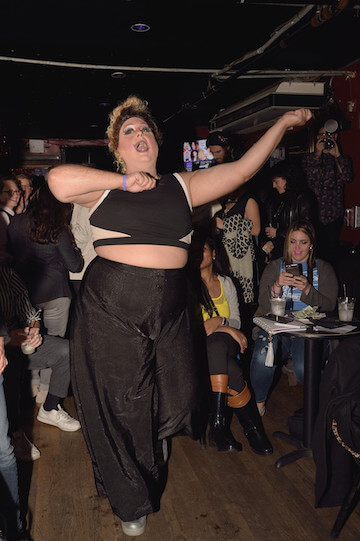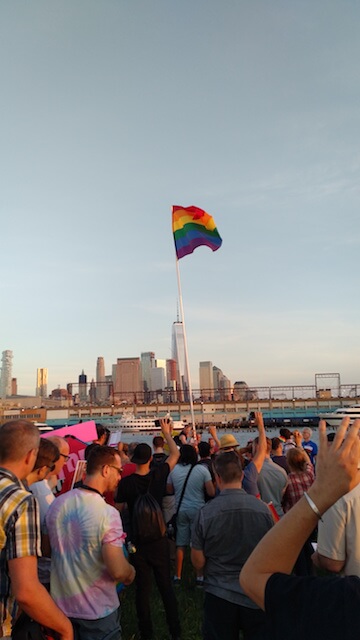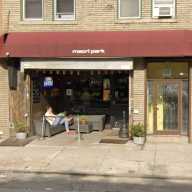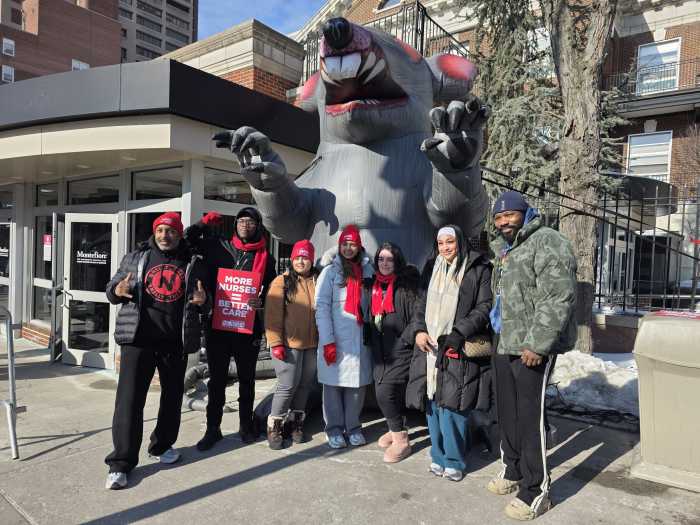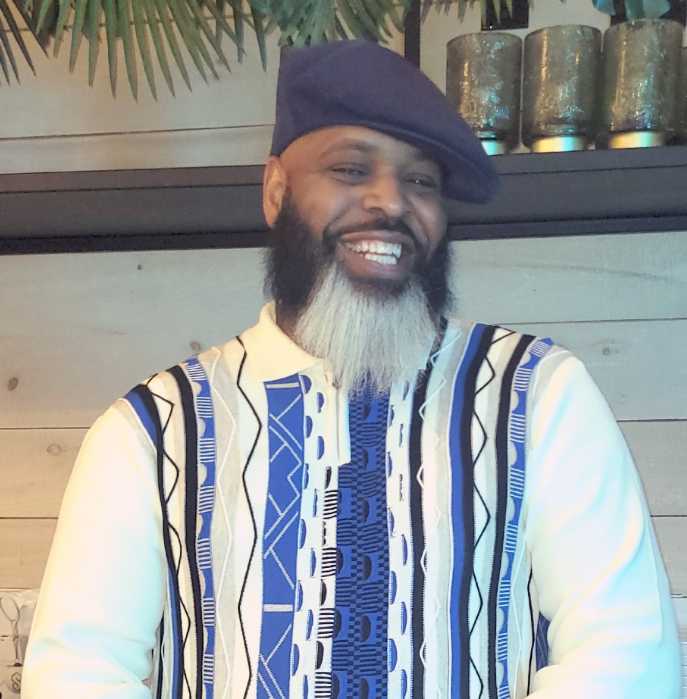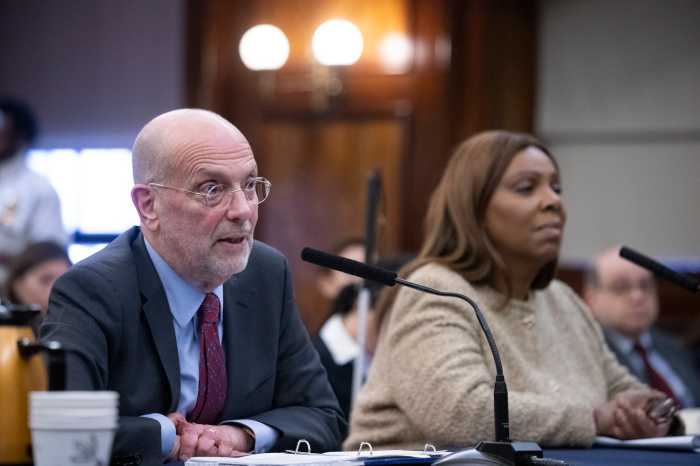BY ANDY HUMM | The push is on to make Julius’ bar in Greenwich Village the second New York City building landmarked because of its unique role in LGBT history — as the scene of a pre-Stonewall civil disobedience action that won gay people the right to be served in public establishments.
The Stonewall Inn, scene of the 1969 rebellion that catalyzed the modern LGBT liberation movement, was given landmark status by the Landmarks Preservation Commission last spring. Julius’ role in LGBT history came three years earlier and, unlike the Stonewall, looks much as it did inside on that occasion almost 50 years ago.
On April 21, 1966, four gay men from the Mattachine Society, a pre-Stonewall gay group, stood at the bar of Julius’ on West 10th Street and Waverly Place and announced, “We are homosexuals. We are orderly, we intend to remain orderly, and we are asking for service.” They were refused on the grounds that the mere presence of gay people in a bar made it a “disorderly” premises subject to closure.
Preservation advocates speak up for Julius’, where 1966 sip-in challenged State Liquor Authority ban
After their famous “sip-in,” the men — Craig Rodwell, John Timmons, Randy Wicker, and Dick Leitsch — challenged the State Liquor Authority regulation and prevailed, a crucial victory in the early gay movement. The New York Times headline on their action read, “3 Deviates Invite Exclusion by Bars.”
Wicker, whose gay activism goes back to 1958 and who is still at it, said, “Only Julius’ refused to serve us that day. Several others willingly obliged our request for a drink, but Julius’ did not want to become a known gay bar. They would police the door and if it got to be too many males inside, they would not let a man in unless accompanied by a female.”
The bartender at Julius’ was particularly jumpy because the day before a minister had been arrested for soliciting another man there and a sticker had been placed on the door declaring the bar “a raided premises.”
Rodwell went on to found the Oscar Wilde Memorial Bookshop in 1967 and co-led the first Christopher Street Liberation Day March — now the LGBT Pride Parade — in 1970. He died of stomach cancer in 1993 at age 52.
Leitsch, the leader of Mattachine then, is still alive and told Gay City News he thought it was “a great idea” to landmark Julius’.
The Greenwich Village Society for Historic Preservation (GVSHP), led by executive director Andrew Berman, is petitioning the city’s Landmarks Preservation Commission to designate Julius’ as a historic landmark before the 50th anniversary of the sip-in, which will be marked by a forum on April 12 at 6:30 at the nearby Jefferson Market Library.
Landmark status “will insure that the building itself and the exterior are regulated and preserved,” Berman said. “It will also give recognition by the City of New York that this is a site of tremendous significance in our city’s history.”
While there were several gay rights demonstrations around the country prior to this, Berman said the sip-in was “the very first planned civil disobedience for LGBT rights in the world.”
Damaris Olivo, spokesperson for Landmarks, wrote in an email that “the request is under review by the agency” and noted that the bar is protected as part of the Greenwich Village Historic District and that any changes to its façade already require the approval of the commission. But she did not respond to a follow-up asking if the request might be calendared in time for the sip-in’s 50th anniversary.
Berman said that the 1969 Village district designation report “makes no mention of the architectural or historical significance [of Julius’]. It goes through building by building, and it is the guide by which the commission regulates. If the report doesn’t highlight special significance, the building is potentially vulnerable to changes — even demolition.”
When GVSHP gathered support for the Stonewall designation in 2014, many of those endorsing it seconded the call for city landmark status for Julius’ — including the National Trust for Historic Preservation, Manhattan Borough President Gale Brewer, State Senator Brad Hoylman, City Councilmembers Corey Johnson and Margaret Chin, and the LGBT Community Center.
In his recent letter to the commission, Berman wrote that in 2012, “The New York State Office of Parks, Recreation and Historic Preservation deemed Julius’ Bar as eligible for listing on the State and National Registers of Historic Places on the basis of its place in LGBT and civil rights history.”
Julius’ has been a bar since 1864 in a building dating to 1826. It was a speakeasy during Prohibition. Its tables, chairs, and bar were made out of wooden barrels from the Ruppert Brewery of Yorkville in the 19th century. It is the city’s oldest continuous gay bar, developing a reputation as such in the 1950s even though gay customers, prior to the sip-in, were sometimes harassed.
Some of its famous gay regulars included Rudolf Nureyev, Tennessee Williams, Vladimir Horowitz, and Truman Capote.
Berman said, “Certainly the interior is an incredibly valuable time capsule and we would like to see the bar continue to operate there in perpetuity with as much of the interior remaining intact as possible, but landmarking generally applies only to exteriors.”
Helen Buford, the owner for the past 14 years — including with her husband Eugene until he died seven years ago — is “very excited” about the prospective landmark status.
“I’m a caretaker of memories,” she said, so that “no one has to worry about it remaining Julius’ bar as long as I am here. My mission is to continue restoring it.”
She said the eighth Mattachine Night party, billed as “spinning vintage vinyl from queer yesteryear,” is set for the bar for Thursday, February 18 at 10 pm, led by performers John Cameron Mitchell, Amber Martin, and Angela Di Carlo.
Tom Bernardin, 67, “the unofficial, self-described historian of Julius’,” in his words, has been a denizen of the bar since 1974 —with some interruptions, coming back for good in 2000 and finding special solace in the community of patrons there after September 11, 2001. He and others raised $6,000 to get a period lamppost installed outside the bar. Bernardin said he welcomes landmark designation, noting that the sip-in was “an accelerant” in the progress toward the Stonewall Rebellion “three years and two months later.”
Bernardin tells the sip-in story in an online video.
This reporter first went to Julius’ in 1972 at age 18 and frequented it more in the late ‘70s as a place to repair to with groups of Dignity members after meetings.
Father Bernárd Lynch of Dignity said, “It used to be my office in the early ‘80s when I did my AIDS ministry.”
He recalled that it was very friendly to priests and said he was just there this week, during a visit from his home in London, to meet an interviewer and enjoyed one of the bar’s famous burger. Lynch noted that the Gay Officers Action League held their early meetings at Julius’.
“To me, Julius’ is a touchstone to our history,” Bernardin said, “a place that gay visitors from the US and foreign visitors come back to. It seems not to change. It’s like going home.”



